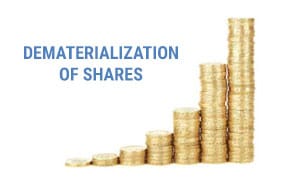Life in this day and age is largely centred around the concept of optimal utilisation of resources, and there is, arguably, no resource more valuable than time. Any process or tool that can help save time is of immense value, and the electronic trading of securities is one such process.

In this article, we shall delve into what is dematerialisation of shares, how it works, and what are the major advantages and disadvantages of share dematerialisation and holding securities in a demat account.
The dematerialisation of shares refers to the process of converting physical share certificates into their electronic counterparts. In order to complete the dematerialisation of your existing share certificates, you must follow the steps mentioned below.
- Open a demat account with any registered depository participant (DP) in India.
- Request a Dematerialisation Request Form (DRF) from your DP and submit the duly filled form to the latter along with the physical share certificates you seek to dematerialise.
- Let the aforementioned DP complete the process of dematerialisation of shares through the respective registrar/s of the relevant companies.
- After receiving the acknowledgement of share dematerialisation from your DP, check your dematerialised shares in your online demat account.
- Enjoy ease of access and a high degree of liquidity vis-a-vis your shares.
There are many advantages of when you open demat account and converting your physical share certificates into digital ones; here are some such advantages:
- Safe Storage Of Share Certificates
With the dematerialisation of shares, your share certificates are safely held in your demat account without risk of theft or physical damage.
- Higher Liquidity
Once your shares have been dematerialised, they become highly liquid, and you can easily place sale orders for the same should you wish to.
- Reduced Costs
By dematerialising your shares, you can benefit from reduced transaction costs since there is no stamp duty on the electronic form of shares.
- Environment-Friendly
The dematerialisation of shares entails a substantial reduction in paperwork for various stakeholders, particularly company registrars, thereby making the process of stock trading relatively less hostile for our blue planet.
- Account Operation By Nominee
You can choose a nominee for your demat account and ensure that there is someone to monitor your investment portfolio in your absence. The dematerialisation of shares results in better control over your portfolio.
- Higher Visibility Of Your Investments
With a demat account and dematerialised shares, you can have your entire portfolio easily accessible. Not only can you check the market value of your portfolio (and individual securities) in your online demat account, but you can also check gains and losses and a wide array of market information.
Here are the major disadvantages associated with the dematerialisation of shares:
- A Host Of Charges For Your Demat Account
There are certain charges that you need to bear in order to keep your demat account functional. Some of the aforementioned charges are account opening charges, transaction costs, and Annual Maintenance Charges.
- Threats Associated With Technology
Since your dematerialised shares are stored in a digital account (your demat account), you are vulnerable to various threats associated with technology.
- No Physical Proof Of Share Ownership
After the dematerialisation of your share certificates, you shall have no physical proof of your share ownership.
To Sum It Up
While the dematerialisation of shares makes the process of stock trading easier, quicker, and cheaper, there are some costs and risks associated with it. However, if you ensure safe browsing and do not share your demat account credentials with anyone, you should be relatively safe from most technological threats.




Recent Comments